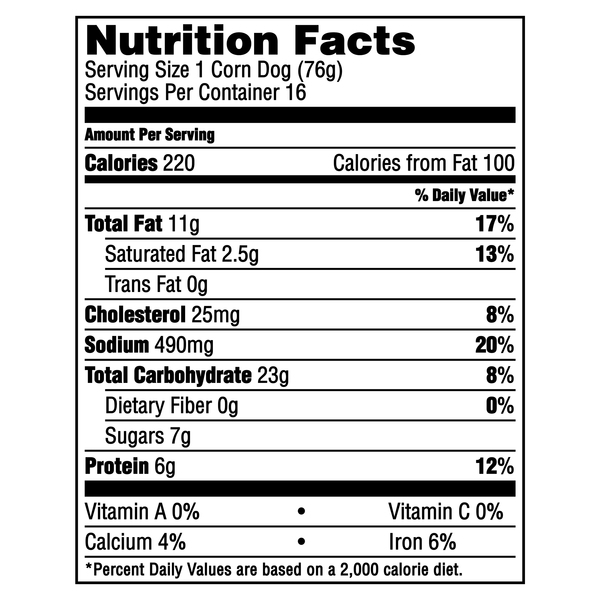Corn dog is a popular Nutrition Info snack choice at fairs and fast-food stands. But what about their nutrition?
Corn dog Nutrition Info Knowing the nutritional content of your favorite meals is essential. Corn dog Nutrition Info is no different, with its crispy outside and flavorful taste. Understanding the ingredients in these delicious delicacies may aid in making healthier nutritional decisions. We will examine the calorie and fat content of corn dogs as well as other nutritional factors in this blog article.
This information can be valuable for those looking to maintain a balanced diet. So, let’s dive into the details of corn dog nutrition and see how they fit into your daily intake.

Introduction To Corn Dogs
Welcome to the world of Corn Dog Nutrition Info! These tasty treats are a favorite at fairs and amusement parks. But what exactly is a corn dog? A thick layer of cornmeal batter coats a hot dog, which then undergoes perfect deep-frying. This creates a crispy outer layer with a juicy center, making it a delightful snack.
History And Origin
Corn dog Nutrition Info has a fascinating history. They first appeared in the United States in the early 20th century. Some believe German sausage makers in Texas created them. They wanted to sell their sausages in a new, exciting way. So, they dipped sausages in cornbread batter and fried them. This invention quickly gained popularity.
Popularity In Modern Times
People of all ages enjoy corn dogs today. They are a staple at carnivals, fairs, and sports events. Corn dogs are also available in grocery stores for simple home preparation. Many food trucks and restaurants offer unique twists on the classic corn dog. Some use different types of sausages or add special sauces. This keeps the corn dog exciting and fresh for new generations.
Nutritional Overview
Corn dog Nutrition Info is a popular snack or meal. They combine a hot dog with a cornmeal batter. Understanding their nutritional profile helps you make informed choices. In this section, we will break down the key nutritional aspects of corn dogs.
Macronutrient Breakdown
Macronutrients are crucial for energy and overall health. Corn dogs provide a mix of protein, carbohydrates, and fats. Here is a basic breakdown:
- Protein 6 gm
- Carbohydrates 23 gm
- Fats 9 gm
One corn dog usually contains around 200 calories. Proteins help build muscles. Carbohydrates provide energy. Fats are essential for various body functions.
Key Vitamins And Minerals
Corn dogs also contain some vitamins and minerals. These nutrients support different body functions. Here is a list of key vitamins and minerals found in corn dogs:
- Vitamin B6
- Vitamin B12
- Iron
- Calcium
Vitamin B6 is important for brain health. Vitamin B12 supports nerve function. Iron is crucial for making red blood cells. Calcium is essential for strong bones.
Though corn dogs can be a tasty treat, remember to consume them in moderation. They are often high in sodium and preservatives.
Calories In Corn dog Nutrition Info
Calories in corn dogs are a common concern for many snack lovers. This beloved fair food can quickly add up in calories. Knowing the caloric content helps make better dietary choices. Let’s dive into the details of corndog nutrition.
Caloric Content
A typical corn dog contains around 200 to 250 calories. This number can vary based on the size and ingredients used.
Below is a table showing the average caloric content of different corn dog sizes:
- Small size 200 gm Calories
- Medium size, 220 gm calories
- Large size 250 gm calories
Factors Affecting Calories
Several factors can affect the calorie count of corn dogs:
- Ingredients: Different brands use different recipes.
- Cooking method: Frying adds more calories than baking.
- Size: Larger corn dogs naturally have more calories.
Knowing these factors can help you make healthier choices. Always check the nutrition label for accurate information.
Protein And Fat Content
Corn dogs offer a mix of protein and fat. Each serving provides a substantial amount of both nutrients. This balance makes them a filling snack choice.
Corn dogs are a popular snack. They offer a mix of protein and fats. Understanding the nutritional value helps make better dietary choices. Let’s dive into the specifics.
Protein Amount
Each corn dog contains about 6 grams of protein. This protein comes from the meat inside. Protein is essential for muscle repair and growth. It also helps keep you feeling full longer.
Types Of Fats
Corn dogs have two main types of fats: saturated and unsaturated. Saturated fats come from the meat and the frying process. Too much saturated fat can raise cholesterol levels. Unsaturated fats are generally healthier. Fryers obtain these fats from the vegetable oil they use. Balancing both types is key to a healthy diet. “`
Carbohydrates And Fiber
Understanding the nutritional content of corn dogs is essential for health-conscious individuals. This section focuses on the carbohydrates and fiber found in corn dogs. Knowing these details helps you make informed dietary choices.
Carb Content
Corn dogs are a popular snack, but they contain a significant amount of carbohydrates. Cornmeal and flour, both high in carbohydrates, make up the batter that coats the hot dog. On average, a single corn dog contains about 24–30 grams of carbohydrates. This carb content comes mainly from the cornmeal batter.
Here’s a breakdown of the typical carbohydrate content in a corn dog:
- Cornmeal Batter 20-25 gm Carbohydrates
- Hot Dog 4-5 gm Carbohydrates
- Total Carbohydrates= 24-30 gm
Presence Of Fiber
Despite the high carbohydrate content, corn dogs have minimal dietary fiber. The cornmeal batter does provide some fiber, but it’s not substantial. On average, a corn dog contains about 1-2 grams of fiber. This amount is not enough to meet daily fiber intake needs.
Here are some facts about fiber in corn dogs:
- The cornmeal provides most of the fiber.
- The hot dog itself has little to no fiber.
- A typical corn dog has only 1-2 grams of fiber.
Including other high-fiber foods in your diet is essential. This helps meet daily fiber requirements. Consider fruits, vegetables, and whole grains for better fiber intake.
Sodium And Cholesterol
Understanding the nutritional facts of your favorite foods helps maintain a healthy diet. Corn dogs are a popular snack, but they may have hidden nutritional concerns. Sodium and cholesterol content are two important factors to consider.
Sodium Levels
Corn dogs contain significant amounts of sodium. Each serving can have around 700 milligrams. High sodium levels can affect blood pressure. Too much sodium can lead to hypertension. It’s essential to monitor your daily intake. The recommended daily limit is 2,300 milligrams. Eating too many corn dogs can quickly exceed this limit. Opt for low-sodium options when available.
Cholesterol Impact
Corn dogs also contribute to your cholesterol levels. A single serving can have 30 milligrams of cholesterol. This contributes to the daily intake limit of 300 mg. High cholesterol levels can lead to heart issues. It’s important to balance your diet. Include foods that help manage cholesterol. Vegetables, fruits, and whole grains are nutritious options. Reducing corndog consumption can benefit your heart health.
Corn dog Nutrition Info And Health
Corn dogs are a popular snack at fairs and carnivals. They are tasty and convenient. But how do they fit into a healthy diet? Let’s explore the potential health benefits and risks of corn dogs.
Potential Health Benefits
Corn dogs can provide quick energy. They contain carbohydrates from the cornmeal batter. The protein in the hot dog helps in muscle repair. Eating corn dogs in moderation can fit into a balanced diet. They can be a source of comfort food, offering mental satisfaction.
Possible Health Risks
Eating too many corn dogs can be unhealthy. Often, deep-frying them adds extra fat. High sodium levels can raise blood pressure. Corn dogs lack essential vitamins and minerals. Overeating them can lead to weight gain. It is important to enjoy corn dogs occasionally and in moderation.

Healthier Corn Dog Nutrition Info Alternatives
Corn dogs are a beloved treat, especially at fairs and carnivals. But they are not always the healthiest choice. Deep-fried and often high in calories, they can be a concern for those watching their diet. Luckily, there are healthier corndog alternatives available. These options can satisfy your cravings without the guilt. Let’s explore some low-calorie options and homemade recipes.
Low-calorie Options
Low-calorie corn dogs use leaner meats. Chicken or turkey sausages are excellent choices. They have fewer calories than traditional beef or pork. Some brands offer corn dogs with fewer calories. Look for baked versions instead of fried ones. Baked corn dogs have less fat and fewer calories. You can also find vegetarian options. These use plant-based sausages and are often lower in calories. They are a wonderful choice for vegetarians or those wanting to reduce meat intake.
Homemade Recipes Corn Dog Nutrition Info
Making corn dogs at home allows you to control the ingredients. Use whole wheat flour for the batter. It adds fiber and nutrients. Try baking instead of frying. Baked corn dogs are healthier and taste great. Choose lean meats like chicken or turkey sausages. You can even try vegetarian sausages. They are tasty and healthy. Add spices to the batter for extra flavor. Paprika, garlic powder, and onion powder work well. Serve with mustard or a low-calorie sauce. This way, you enjoy a tasty treat without the extra calories.
FAQ of Corn Dog Nutrition Info
What Are The Calories In A Corn Dog?
A typical corn dog contains around 220 to 250 calories. This value may vary based on size and brand.
How Much Protein Does A Corn Dog Have?
A standard corn dog provides about 6 to 7 grams of protein. Protein content can differ by brand and recipe.
Are Corn Dogs High in Fat?
Corn dogs are moderately high in fat, containing approximately 10 to 13 grams of fat. This includes both saturated and unsaturated fats.
Do corn dogs contain dietary fiber?
Corn dogs generally have low dietary fiber, usually less than 1 gram per serving. They are not a significant source of fiber.
Conclusion
Corn dogs offer a tasty treat, but watch your intake. They can be high in calories, fat, and sodium. Balancing them with healthier choices helps maintain a nutritious diet. Always check the nutritional info before indulging. Remember, moderation is key.
Enjoy corn dogs as an occasional treat rather than a regular meal. This way, you can savor the flavor without compromising your health goals. Stay informed, eat wisely, and enjoy your food.











